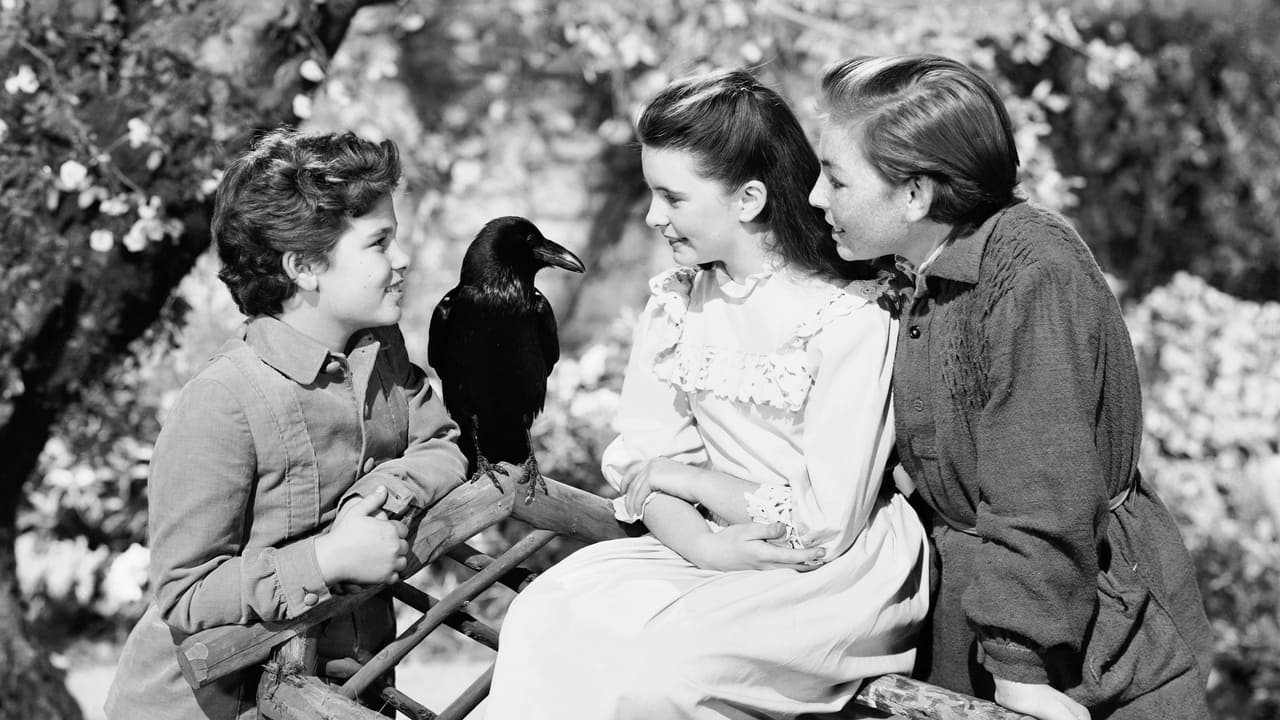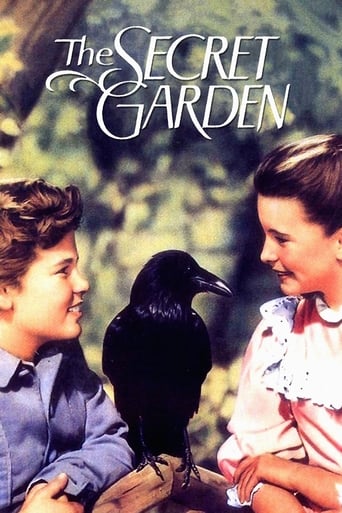JLRVancouver
Child star Margaret O'Brien leads a young(ish) central cast including Dean Stockwell and Brian Roper. The first two looked a couple of years older than the 10 year old characters and Roper was 20, and although he looked younger than that, he didn't look like a child (albeit the character is supposed to be a little otherworldly, think Francis of Assisi or Melampus). The black and white cinematography is good and the transition to colour when the Secret Garden begins to bloom is quite effective. While not as scenic or true to the book as the 1994 version, this is a good retelling with the notable exception of the axe scene. Why the writers felt that the possibility of murder needed to be introduced, then immediately dropped, into a children's tale of love, loss, and rebirth is beyond me.
dougdoepke
Intrigued by the title, I wanted to see this movie back in '49, but missed it. Probably didn't have the money. Anyway, I'm really glad to have finally caught up with it. From the stylized backdrops to the shrewd use of Technicolor to the overriding performances, the movie's a real treat, both as story and metaphor.Poor little Mary's (O'Brien) parents have died, and she's been sent to live with her cold- hearted uncle (Marshall) in a big gloomy mansion. She's been shunned and told she's homely by her parents, and now, in the mansion, her uncle refuses even to see her. As a result, she's become understandably mean and bratty. It doesn't help that in the night, she hears piercing unearthly screams, while the servants race to a mysterious upper room. Turns out it's her uncle's bed-ridden young son Colin (Stockwell) in torment. He too has been rejected, told he's crippled, and must stay in his room. Thus, he never gets to go outdoors into the sunlight. As a result, he too has become mean and bratty, like his young cousin. On the whole, I don't think I've seen more jarring behavior from adolescents than these two unfortunates, especially when they wreck his bedroom trying to outdo one another in meanness. Good thing there's a servant's young son, Dickon (Roper), to serve as an emotional anchor.But then, in her wanderings around the grounds, Mary discovers what amounts to a strange presence. It turns out to be a secret garden that no one ever talks about. Its grounds are surrounded by a high wall and a locked gate kept hidden by overgrown brush. But every time she pokes around, the gardener shoos her away. Naturally she's intrigued. What's in there, and why are the contents kept locked and secret. Seems Dickon, her frequent companion, would also like to find out. Now, unknown to them is the uncle's story behind the garden. Seems the uncle was having tea with his beloved wife in the garden when it was open and happy. But then out of nowhere a tree branch fell and crushed her. Ever since, he's been haunted, trying to bury the memory behind a locked gate. As a result, he too has become withdrawn and unhappy, thus adding to the travails of his young son and niece. Now, except for the servants, it's an intensely unhappy household.All in all, it's hard for me not to see the "secret garden" as a kind of metaphor for the inner lives of the three family members. I want to merely suggest the following view of what may be going on in the subtext, without claiming it was anybody's "intended" meaning. Now, all three for various reasons, have sealed off their inner lives not only from others but from themselves. Thus each harbors his or her own locked "secret garden" and allowed it, like the real one, to become untended and unflowering. Hence their unhappiness. But where to find the key to unlock the gate not only to the real garden but to themselves. The raven-- perhaps standing for free flight-- finds the real one; Mary, I think, finds her own inner key in the yellow daffodil blossom a beautiful sight. When she holds it up, it shows her what the garden could become if it were tended. That she needs to unlock the gate comes from her seeing her outer self in the tormented Colin. By helping him, she's also helping herself to open up to what's been sealed off. In Uncle's case, he more implausibly adjusts through knowing that the garden is again open and flowering. The tending is thanks to Dickon, Mary, and Colin who have since joined together, instead of remaining enclosed and apart. Thus the "secret garden" is no longer secret, either the real one or the metaphorical one. Using Technicolor to express this transformation from the gray was, I think, a daring and striking move. Now all four sit together, enjoying the garden and each other. A happy family, at last.It's O'Brien's film that she carries in effective fashion. At times, she's close to going over the top, yet her presence remains a strong one throughout. Stockwell too registers in a difficult role, requiring screaming hissy-fits that O'Brien answers in kind. Perhaps surprisingly, the illustrious supporting cast hasn't much to do. Marshall has only a couple extended scenes, while Lanchester provides a dollop of comic relief in her one extended scene. As the third member of the youthful trio, Brian Roper provides solid support. Too bad he didn't stay in the USA. On the other hand, I can't help thinking that George Zucco's benevolent doctor was an effort at compensating for Aubrey Mather's corrupt medical man who keeps poor Colin in unneeded leg braces.Anyway, the movie's a fine, atmospheric production from MGM, with a strong storyline and a good moral. It may have taken decades, but I'm glad I finally caught up with it.
atlasmb
"The Secret Garden" is a wonderful adaptation of a classic novel. it starts out as a B&W thriller worthy of Hitchcock. As the layers of the story unfold, and the mysteries are solved, it resolves into a mixture of drama and comedy.Mary Lennox (Margaret O'Brien) is an orphaned child who finds refuge in the household of a distant uncle. As in "Heidi" and countless other films, the child must cope with strange environs and a clash of personalities. Eventually, she befriends two young boys. Together, they solve the mysteries of the dark mansion and--through their friendship--break through the air of oppression that shrouds the house and its secret garden.The production values are great. The music drives the moods of the story. The cast is excellent in every role, but Margaret O'Brien must be singled out for her ability, at such a young age, to contribute whatever emotions are required. The lighting also makes a significant contribution to the story, giving the mansion very different moods in daylight or nighttime. Color is used sparingly, where it is most dramatic.So much of this film captures the imagination; especially the imagination of a child: The very concept of a secret garden. The various animals. The idea of a foreboding mansion with many undiscovered rooms. At one point, Mary says, "I don't want to grow up." This is a story about the importance of childhood and the wonderful mysteries that capture the imagination of a child. It is also a story about love and its ability to cure the human psyche.
bkoganbing
It looks like there have been a gazillion version of Frances Hodgson Burnett's popular novel for children made. This one apparently is the most popular, the one most people will remember.It's a wonderful allegorical tale about how one has to give in life in order to receive. It also is about the maturing of a couple of really bratty kids.Margaret O'Brien is a child of the British Raj in India, quite used to having things her own way as her parents are a big-shot and his lady. But when both are taken away by an epidemic, she has to go back to Great Britain to live with an uncle, Herbert Marshall for whom the mildest thing that can be said is eccentric.She's given rather restrictive use of the vast house, though the grounds are her's to roam with the exception of a garden that is locked up. Many years ago Marshall's wife has died there and it's her death and the circumstances thereof that have driven him to the brink of dissolution and insanity.O'Brien also finds she has a cousin roughly her age who is bedridden with paralysis in Dean Stockwell. Stockwell has not born his affliction well and in fact is a bigger brat than she is. Dealing with him has forced her to confront her own misbehavior.A large part of Stockwell's problems are his doctor and caregiver in the persons of doctor Aubrey Mather and housekeeper Gladys Cooper. They like having him dependent on them, it increases their position in the house, as for Mather, he's making a whole living off Marshall treating his child.The younger brother of maid Elsa Lanchester, Brian Roper, also becomes a friend to both as they discover the locked up and neglected garden and use it as a playground. With the special love that children bring to something, interesting things start happening there.Most of the cast are familiar names to the American cinema, all the adults are card carrying members of the British colony in Hollywood. But Brian Roper was imported from across the pond because of the fact that he spoke with a Yorkshire brogue, he was native to that part of England. It does lend an air of authenticity to the film. Roper had a fair career for about a decade, mostly in his native country. I believe this is his one and only American film appearance.The Secret Garden is a fine adaption of the children's novel, maybe the best one ever done. The adults are hard pressed in this one to even get their innings in as the kids totally steal this film.

